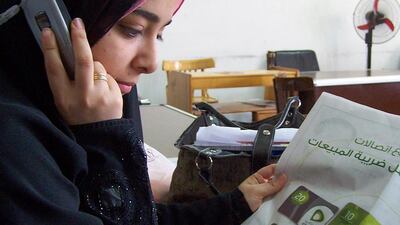Etisalat’s Egyptian subsidiary has signed licensing agreements enabling it to provide 4G high-speed mobile data services in the North African country.
The National Telecommunications Regulatory Authority said on Sunday that it had awarded 15-year 4G licences to Etisalat Misr and fellow mobile operator Vodafone Egypt for US$535.5 million and $335m respectively.
A spokesman for the regulator said that the different amounts paid for the licences reflected the differing amounts and quality of the spectrum awarded to each operator, giving no further details.
The two operators also separately paid $11.3m for licences to offer a virtual fixed-line service in the country, according to the spokesman.
4G, offering high-speed mobile downloads and uploads, has been available from operators in the UAE since late 2011.
The new licence agreements for Vodafone and Etisalat come after Orange Egypt, a subsidiary of French operator Orange, was awarded a 4G licence at the end of last week for $484m, alongside a fixed-line licence for $11.3m.
State-owned Telecom Egypt was awarded a 4G licence for 7.08 billion Egyptian pounds (Dh2.91bn) in late August, half of which was paid in US dollars, marking its first entry into Egypt’s mobile sphere.
The award of the 4G licences comes after months of sometimes fraught discussions between the NTRA and the country’s operators, after the regulator initially set conditions for the new licensing regime in June.
The country’s three privately-owned operators declined to apply for 4G licences as recently as the end of September, complaining of high fees and the spectrum being offered of insufficient quantity.
The NTRA responded by floating the possibility of awarding the licences to outside parties, with Kuwait’s Zain, China Telecom, Saudi Telecom and Lebara all expressing an interest.
“For the continued development of Egypt’s telecoms sector and the potential economic and social benefits that it can bring to Egypt, it’s important that the earlier impasse over 4G LTE licensing seems to have been overcome so that the main mobile operators will be able to introduce the technology,” said Matthew Reed, a Dubai-based analyst with consultancy Ovum.
jeverington@thenational.ae
Follow The National's Business section on Twitter

